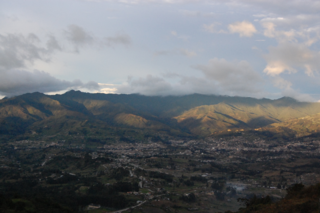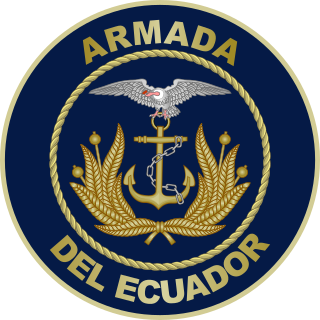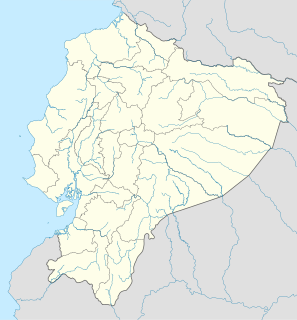
Ecuador, officially the Republic of Ecuador, is a country in northwestern South America, bordered by Colombia on the north, Peru on the east and south, and the Pacific Ocean on the west. Ecuador also includes the Galápagos Islands in the Pacific, about 1,000 kilometres (620 mi) west of the mainland. The capital city is Quito, which is also the largest city.

Ecuadorians are people identified with Ecuador, a country in South America, its citizens or their descendants abroad who identify with the Ecuadorian culture and descent. Ecuador is a multiethnic society, a home to people of various ethnic origins; as a result, Ecuadorians do not equate their nationality with their ethnicity, but rather their allegiance or affinity for Ecuador. Majority of Ecuadorians trace their origins to one or more of three geographical sources of human migrations to the territory of modern Ecuador: the pre-Hispanic indigenous populations who settled the region over 15,000 years ago, the Europeans who arrived over five centuries ago, and ultimately the sub-Saharan Africans who were imported to New Spain as slaves during the same period. The mixing of two or more of these three groups established other mixed ethnic groups.

The Ecuador national football team represents Ecuador in international football competitions and is controlled by the Ecuadorian Football Federation. They play official home matches at Estadio Olímpico Atahualpa in Quito.

Loja, formerly Loxa and fully City of the Immaculate Conception of Loja, is the capital of Ecuador's Loja Province. It is located in the Cuxibamba valley in the south of the country, sharing borders with the provinces of Zamora-Chinchipe and El Oro, and with Peru in the south. Loja holds a rich tradition in the arts, and for this reason is known as the Music and Cultural Capital of Ecuador. The city is home to two major universities.

The Ecuadorian–Peruvian War, known locally as the War of '41, was a South American border war fought between 5–31 July 1941. It was the first of three military conflicts between Ecuador and Peru during the 20th century. During the war, Peru occupied the western Ecuadorian province of El Oro and parts of the Andean province of Loja. Although the Ecuadorian–Peruvian War occurred during World War II, it was not part of the conflict; Ecuador and Peru were neither affiliated with nor supported by the Allies or the Axis.

Agustín Javier Delgado Chalá is a retired Ecuadorian footballer who played as a forward. Nicknamed Tín, Delgado is the all-time top scorer for the Ecuadorian national team with 31 goals in 71 games. He played professional club football in Ecuador, Mexico and England.

Juan León Mera Martínez was an Ecuadorian essayist, novelist, politician and painter. His best-known works are the Ecuadorian National Hymn and the novel Cumandá (1879). Additionally, in his political career, he was a functionary of president Gabriel García Moreno.
The Daily Naya Diganta is a Bengali daily newspaper published in Bangladesh since 2004.
The cinema of Ecuador has a long history, including both short and feature-length films made throughout the 20th century, but until recently Ecuadorian film has generally not had a large impact.

Naya Marie Rivera is an American actress and singer. She began her career as a child actress and model, appearing in national television commercials before landing the role of Hillary Winston on the short-lived CBS sitcom The Royal Family at the age of 4 (1991–1992), for which she received a nomination for a Young Artist Award. After a series of recurring television roles and guest spots as a teenager, Rivera received her breakthrough role as an adult as Santana Lopez on the Fox television series Glee (2009–2015), for which she received nominations for numerous accolades. She was signed to Columbia Records as a solo artist in 2011 and released a single in 2013, "Sorry", featuring rapper Big Sean.

The Ecuadorian Navy is responsible for the surveillance and protection of national maritime territory and has a personnel of 9,127 men to protect a coastline of 2,237 km which reaches far into the Pacific Ocean. The vessels are identified by the ship prefix B.A.E.: Buque de la Armada del Ecuador.

Medardo Ángel Silva Deleg was an Ecuadorian poet and a member of the Generación decapitada. The "Decapitated Generation" was a group of four young Ecuadorian poets in the first decades of the 20th century. Two men from Guayaquil, Medardo Ángel Silva and Ernesto Noboa y Caamaño, and two men from Quito, Arturo Borja and Humberto Fierro, were the precursors of modernismo in Ecuador. These four writers were greatly influenced by the modernist movement of Rubén Darío and by 19th-century French romantic poetry. Though they knew each other and dedicated poems to each other, they never met together to create a true literary group. The term "generación decapitada" originated in the middle of the 20th century, when Ecuadorian journalists and historians decided to name them, noting similarities in the authors' poetry.

Cesar E. Chavez National Monument is a 116-acre (47 ha) U.S. National Monument in Keene, Kern County, California located about 32 miles away from Bakersfield, California. The property was the headquarters of the United Farm Workers (UFW), and home to César Chávez from the early 1970s until his death in 1993, Chávez's gravesite is located in the property's gardens along with that of his wife, Helen Fabela Chávez. Originally developed as a headquarters and worker housing area for a quarry, it served as a tuberculosis sanitarium in the early 1900s, until its acquisition by the UFW in the early 1970s.
Cumandá o Un drama entre salvajes is a classic Ecuadorian novel by Juan León Mera. The novel was written in 1877.

Camilo Luzuriaga is an Ecuadorian film producer, actor, writer, photographer, and director.
Alfredo Palacio Moreno was an Ecuadorian sculptor and painter.
Edmundo Ribadeneira Meneses was an Ecuadorian writer and university professor.

Eliécer Cárdenas Espinosa is an Ecuadorian novelist.














